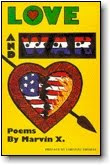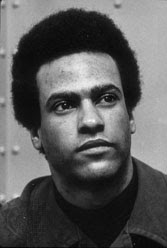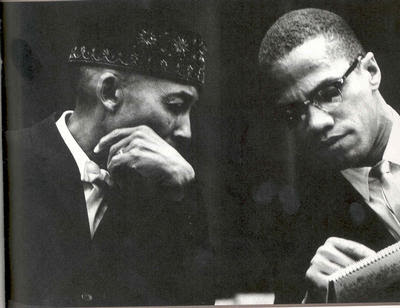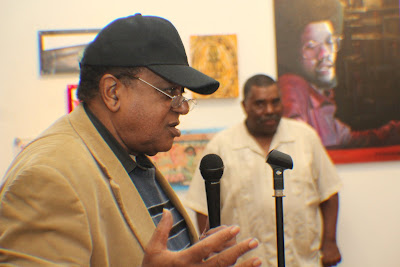Marvin X, Fly to Allah, Harlem NY, 1968

Marvin X, Black Educational Theatre, 1972,
San Francisco
...In 1967 LeRoi Jones visited Karenga in Los Angeles and became an advocate of Karenga's philosophy of Kawaida. Kawaida, which produced the "Nguzo Saba" (seven principles), Kwanzaa, and an emphasis on African names, was a multifaceted, categorized activist philosophy. Jones also met Bobby Seale and Eldridge Cleaver and worked with a number of the founding members of the Black Panthers. Additionally, Askia Touré was a visiting professor at San Francisco State and was to become a leading (and longlasting) poet as well as, arguably, the most influential poet-professor in the Black Arts movement. Playwright Ed Bullins and poet Marvin X had established Black Arts West, and Dingane Joe Goncalves had founded the Journal of Black Poetry (1966). This grouping of Ed Bullins, Dingane Joe Goncalves, LeRoi Jones, Sonia Sanchez, Askia M. Touré, and Marvin X became a major nucleus of Black Arts leadership....
Black Dialogue editors/writers: left to right: Aubrey Labrie, Marvin X, Abdul Karim, Al Young, Arthur Sheridan, Duke Williams
.The first major Black Arts literary publication was the California-based Black Dialogue (1964), edited by Arthur A. Sheridan, Abdul Karim, Edward Spriggs, Aubrey Labrie, and Marvin Jackmon (Marvin X). Black Dialogue was paralleled by Soulbook (1964), edited by Mamadou Lumumba (Kenn Freeman) and Bobb Hamilton. Oakland-based Soulbook was mainly political but included poetry in a section ironically titled "Reject Notes."
Dingane Joe Goncalves became Black Dialogue's poetry editor and, as more and more poetry poured in, he conceived of starting the Journal of Black Poetry. Founded in San Francisco, the first issue was a small magazine with mimeographed pages and a lithographed cover. Up through the summer of 1975, the Journal published nineteen issues and grew to over one hundred pages. Publishing a broad range of more than five hundred poets, its editorial policy was eclectic. Special issues were given to guest editors who included Ahmed Alhamisi, Don L. Lee (Haki R. Madhubuti), Clarence Major, Larry Neal, Marvin X, Dudley Randall, Ed Spriggs, and Askia Touré. In addition to African Americans, African, Caribbean, Asian, and other international revolutionary poets were presented....
--kalamu ya salaam
The Public Career of Marvin X by James G. Spady
30 Years of Teaching and Writing: The Public Career of Marvin X
by
James G. Spady
Copyright James G. Spady, 1997,
Philadelphia New Observer
Marvin X has been teaching for a long time. He has established his tenacity. As one of the founders of the Black Arts Movement (BAM), he became a teacher in an emerging field called Black Studies. Like Sonia Sanchez, Amiri Baraka, Larry Neal, Askia Toure and others, Marvin X both contributed to and later taught those pivotal courses that constituted a new discipline.
For the last thirty years, this gifted poet, journalist, dramatist, oral historian (he appears to be the only participant in the Black Arts Movement that conducted intensive and extensive oral interviews with the key participants, as well as international political, cultural and educational leaders)and teacher, has established an unusual record. Marvin X has taught at the University of California at San Diego, Mills College, San Francisco State University, Fresno State University,
Laney and Merritt Colleges in Oakland, University of Nevada,Reno, and the University of California at Berkeley.
His peers were among the first to recognize his ability. The well-known African American man of the Arts and Letters, Amiri Baraka, refers to Marvin X as "one of the outstanding African writers and teachers in America. He has always been in the forefront of Pan African writing. Indeed, he is one of the founders and innovators of the new revolutionary school of African writing."
One of the best known playwrights in America is Ed Bullins. He refers to X as "one of the founders of the modern day Black theatre movement. He is a Black artist par excellence." The editor of Black Scholar magazine, Robert Chrisman, spoke of Marvin as "an extraordinary distinguished poet who has a powerful sense of meaningful drama"....
After high school (1962), Marvin enrolled in Oakland City College, aka Merritt College. There he met Huey Newton and Bobby Seale, who went on to found the Black Panther Party. It was at OCC that Marvin began to undergo a vital change. He listened intently as speaker after speaker addressed the ever-growing members of the cognoscente at Oakland City College. They, like many area colleges, benefited from the organizing and conscious-raising activities of the Afro American Association under the leadership of a young black lawyer, Donald Warden (now Khalid Abdullah Al Mansour). Marvin's early writings appeared in the Merritt College literary magazine.
Upon receiving the A.A. degree, Marvin went on to San Francisco State University, 1964. Marvin wrote a play for one of his English classes. The professor, legendary novelist John Gardner, was sufficiently impressed to carry it over to the theatre department. In the Spring of 1965, Marvin X's one-act play "Flowers for the Trashman" was produced at San Francisco State, a novel experience for an African American. It is even more exceptional in that it was his first play. (Published initially in Black Dialogue, Winter, 1966 and later in Black Fire, edited by Larry Neal and LeRoi Jones).
Marvin X soon met Philly playwright Ed Bullins, introduced to him by Art Sheridan, founding editor of Black Dialogue magazine. Ed and Marvin founded Black Arts West Thetre in the Fillmore. Black Arts West was certainly influenced by the Black Arts Movement in the East, mainly New York and Philadelphia.
The role of Amiri Baraka in shaping national Black consciousness can not be overemphasized. However, Marvin X, Hillary X, Ethna X, Duncan X (as they would become in a few months after joining the Nation of Islam, circa 1967), along with Ed Bullins and Farouk (Carl Bossiere, rip)were part of an indigenous Black Arts Movement....
by James G. Spady, Philadelphia New Observer,1997
copyright (c) 1997 by James G. Spady
...The poetry of Marvin X is deeply rooted in the cosmological convictions of his ancestors and his community. His individual identity is inextricably linked to his communal identity. That is why it functions as a source of power and inspiration. Because he is open to the magico-realist perception or reality and has the authentic experiences of the streets, Marvin's works strike a chord. Nowhere is this better exemplified than in a recent collection, Love and War, 1995.
![]()
"Read Love and War for Ramadan!"--Dr. Mohja Kahf, University of Arkansas, Department of English and Islamic Literature
cover art by Emory Douglas, Black Panther Minister of Culture
He introduces the work with these words, "Love and War is my poetic story of rediscovering self love and the internal war (Jihad) to reconquer my soul from the devil who whispers into the hearts of men, Al Qur'an. But I am also mindful of socio political conditions of my people. And this reality fills me with compassion and love, forcing me once again (now that I am clean and sober) to put on the armor of God and return to the battlefield. This collection is a signal of my return to the struggle of African American liberation after an absence of nearly a decade, caused by disillusionment and drug abuse. I return with the spirit of my friend, Huey P. Newton, rip, shaking my bones. He and I were often in the same drug territory and but for the grace of God, I chould have easily suffered a fate similar to his. I came close many times. Praise be to Allah."
copyright (c) 1997 by James G. Spady
...The poetry of Marvin X is deeply rooted in the cosmological convictions of his ancestors and his community. His individual identity is inextricably linked to his communal identity. That is why it functions as a source of power and inspiration. Because he is open to the magico-realist perception or reality and has the authentic experiences of the streets, Marvin's works strike a chord. Nowhere is this better exemplified than in a recent collection, Love and War, 1995.

"Read Love and War for Ramadan!"--Dr. Mohja Kahf, University of Arkansas, Department of English and Islamic Literature
cover art by Emory Douglas, Black Panther Minister of Culture
He introduces the work with these words, "Love and War is my poetic story of rediscovering self love and the internal war (Jihad) to reconquer my soul from the devil who whispers into the hearts of men, Al Qur'an. But I am also mindful of socio political conditions of my people. And this reality fills me with compassion and love, forcing me once again (now that I am clean and sober) to put on the armor of God and return to the battlefield. This collection is a signal of my return to the struggle of African American liberation after an absence of nearly a decade, caused by disillusionment and drug abuse. I return with the spirit of my friend, Huey P. Newton, rip, shaking my bones. He and I were often in the same drug territory and but for the grace of God, I chould have easily suffered a fate similar to his. I came close many times. Praise be to Allah."

"Marvin X was my teacher, many of our comrades came through his black theatre: Bobby Seale, Eldridge Cleaver, Emory Douglas, George Murray and Sam Napier."
--Dr. Huey P. Newton,co-founder of the Black Panther Party
...Craft is essential to Marvin X's poetry and drama. He knows the possibilities and constraints of the form. And he also knows how to expand. He credits Sun Ra with having helped him to realize the full possibilities of theatre. Marvin read his poetry in San Ra's grand musical energy field and he closely observed Sonny's skillful exploration of our Omniverse and all of its real possibilities. Was it not Sun Ra who told Marvin X that he would be teaching at U.C. Berkeley before it happened?
They performed together from coast to coast. This pic is outside Marvin's Black Educational Theatre in San Francisco's Fillmore, 1972. Sun Ra wrote the music
for Marvin's play Take Care of Business,
the musical version of Flowers for the Trashman.
...Nearly 30 years ago, Marvin sought to teach the relationship of Islam and Black Art. In his published conversation with Amiri Baraka, he attempted to reconcile and provide voices and faces for the different expressions of Islam in the West.
As a skilled interviewer, he allows Askia Toure and Baraka's divergent views of Islam to be placed into the record. In the afterword he states, "I believe the Honorable Elijah Muhammad is at least ten years ahead of any Black group working for freedom, justice and equality in the hells of North America. The Islamic ideology, discipline and organizational structure permits the masses of our people to fully develop their self-identity, self defense and self-government."
Again, X is out front. He recognized the tremendous influence Islam had on the Black Arts Movement. He is a case study in that type of influence....
![]()
Elijah and Malcolm, major influences on Marvin X. He honors both men.
....Marvin X is credited with convincing Eldridge Cleaver to use his advance against royalties from the popular book Soul on Ice, to help set up Black House. The building became "the mecca of political, cultural activity in The Bay Area. Among artists featured were: Sonia Sanchez,Vonetta McGee, Amiri and Amina Baraka, Chicago Art Ensemble,
Avoctja, Emory Douglas, Sarah Webster Fabio, et al. Playwright Ed Bullins joined Marvin and Eldrdige at the Black House, along with Marvin's partner, Ethna X (Hurriyah Asar), and singer Willie Dale, Cleaver's buddy from San Quentin.
...Nearly 30 years ago, Marvin sought to teach the relationship of Islam and Black Art. In his published conversation with Amiri Baraka, he attempted to reconcile and provide voices and faces for the different expressions of Islam in the West.
As a skilled interviewer, he allows Askia Toure and Baraka's divergent views of Islam to be placed into the record. In the afterword he states, "I believe the Honorable Elijah Muhammad is at least ten years ahead of any Black group working for freedom, justice and equality in the hells of North America. The Islamic ideology, discipline and organizational structure permits the masses of our people to fully develop their self-identity, self defense and self-government."
Again, X is out front. He recognized the tremendous influence Islam had on the Black Arts Movement. He is a case study in that type of influence....

Elijah and Malcolm, major influences on Marvin X. He honors both men.
....Marvin X is credited with convincing Eldridge Cleaver to use his advance against royalties from the popular book Soul on Ice, to help set up Black House. The building became "the mecca of political, cultural activity in The Bay Area. Among artists featured were: Sonia Sanchez,Vonetta McGee, Amiri and Amina Baraka, Chicago Art Ensemble,
Avoctja, Emory Douglas, Sarah Webster Fabio, et al. Playwright Ed Bullins joined Marvin and Eldrdige at the Black House, along with Marvin's partner, Ethna X (Hurriyah Asar), and singer Willie Dale, Cleaver's buddy from San Quentin.

Eldridge Cleaver, see Marvin X's memoir, Eldridge Cleaver, My friend the Devil, 2009 Upon his release from Soledad prison, Marvin X was the first person he hooked up with. Later Marvin introduced him to Huey Newton and Bobby Seale.
....Marvin X is a teacher of primeval knowledge, a knower of both street poetry and book poetry. In fact, he combines the two in a powerful way. Each verse is a teach act, each stanza--a class. His use of alliteration, rhymes, assonance, dissonance and free rhymes indicates he has absorbed the teachings of the academy. Yet, the street consciousness lying in the cut of its content links him directly to the poets of the new idiom called Rap.
Amiri Baraka (RIP), Bobby Seale, Dr. Ayodele Nzinga, Ahi Baraka, Marvin X at his Academy of da Corner, 14th and Broadway, Oakland, Black Arts Movement Business District.
His experimental verses are wholistic, historical and yet dialogical. The dynamic complexities of the situation creates in the reader an urgent need to know more. Can we expect anything else from a good teacher?



